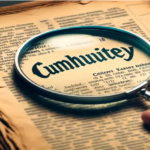Introduction to the C.W. Park USC Lawsuit
W. Park USC Lawsuit
W. Park C.W. Park USC Lawsuit has sparked intense discussions across campuses and communities. With layers of complexity, this case dives deep into issues that resonate beyond the walls of academia. It touches on ethics, accountability, and institutions’ responsibilities towards their students and staff. As details emerge, both supporters and critics are weighing in on its implications for higher education as a whole. What makes this lawsuit so controversial? Let’s unravel the threads of this gripping legal battle that could reshape policies at universities nationwide.
Background on the Controversy
The C.
C.W. Park USC Lawsuit emerged from a series of unsettling allegations that shook the University of Southern California community. It revolves around claims of misconduct tied to both faculty and administrative practices.
As details unfolded, it became evident that this case was more than just a legal battle. It exposed deep-rooted issues within the university’s governance and oversight mechanisms, and students, alumni, and educators began questioning the integrity of their institution.
Many felt that such controversies were emblematic of broader trends in higher education, where institutional interests often overshadow individual rights. This sparked discussions about accountability and transparency at universities nationwide.
Reactions varied widely; some stood firmly behind C.
W. Park, while others expressed unwavering support for USC’s leadership during turbulent times. The controversy has undeniably ignited passionate debates regarding academic ethics, with far-reaching implications beyond the confines of one case or campus.
Key Players and Their Roles in the Lawsuit
The C.
The C.W. Park USC Lawsuit involves several key figures whose actions and decisions shape this high-profile case’s narrative.
At the forefront is C.
W. Park himself, a former student with compelling claims against the university. His allegations have sparked debate on accountability and institutional responsibility.
USC’s administration also plays a pivotal role. Their response to these allegations will be scrutinized closely, influencing public perceptions of their commitment to upholding ethical standards.
Legal representatives for both sides add another layer of complexity. They navigate intricate legal frameworks while advocating fervently for their client’s interests.
Students and alumni are not mere bystanders in this situation; they represent voices that resonate throughout campus discussions, fueling advocacy or dissent based on personal experiences with the institution’s governance practices.
The Allegations Against USC and C.
W. Park
The allegations against USC and C.
W. Park has stirred significant debate within the academic community. Accusations range from financial improprieties to ethical violations in university practices.
C.
W. Park is accused of mismanaging funds intended for student programs, causing a ripple effect that impacted numerous initiatives. Critics allege this behavior undermines the very mission of higher education institutions, which are supposed to prioritize student welfare.
USC also faces scrutiny, claiming it failed to oversee its employees’ actions properly. This lack of accountability raises questions about the university’s governance structure and commitment to transparency.
Furthermore, there are whispers of a culture that may protect powerful individuals at the expense of justice for students and staff. These serious allegations highlight potential systemic issues within USC that could resonate far beyond this case.
Implications for Higher Education Institutions
The C.
The W. Park USC lawsuit is sending ripples through the higher education landscape. Institutions will need to reassess their policies and practices regarding allegations of misconduct.
This case highlights the importance of transparency in handling such claims. Colleges may be under increased scrutiny from the public and government agencies.
Moreover, it could lead to stricter regulations to protect students and ensure fairness in investigations. Universities might rethink how they train faculty and staff to manage sensitive situations effectively.
Trust is essential in academia, and a high-profile lawsuit can quickly erode that trust. Schools must prioritize open communication with their communities about these issues moving forward.
As legal precedents are set, other institutions will likely adapt their frameworks to avoid similar controversies. The implications extend beyond just one university; they affect an entire system striving for equity and integrity.
Reactions from the Public and USC Community
The C.
W. Park USC lawsuit has ignited a firestorm of reactions across various platforms. Many alumni and current students have taken to social media, expressing shock and disappointment.
Comment threads are filled with heated debates. Some strongly support Park, while others defend the university’s actions. This division illustrates deeper issues within the community regarding trust in institutions.
Faculty members have also chimed in, cautiously navigating their opinions on academic freedom versus institutional responsibility.
Meanwhile, organizations advocating for student rights see this as an opportunity to push for reforms. They argue that transparency is crucial in maintaining faith in educational systems.
Public sentiment seems to oscillate between outrage over alleged misconduct and concern about the implications of such high-profile cases for USC’s campus culture.
What This Means for Future Cases and Changes in Policies
The C.
W. Park USC lawsuit could set significant precedents for future cases involving similar allegations against educational institutions. As the legal landscape evolves, this case may encourage more individuals to come forward with their experiences.
A heightened awareness of such lawsuits might result in increased scrutiny of university policies. Schools could be prompted to reassess their protocols concerning student safety and conduct.
This scenario also allows legislative changes to enhance accountability among higher education establishments. Lawmakers may feel pressured to implement stricter regulations governing how institutions handle complaints.
Moreover, universities will likely invest in training programs focused on ethics and compliance. By doing so, they can proactively address issues before they escalate into legal disputes, fostering a safer academic environment overall.
Conclusion
The C.
C.W. Park USC Lawsuit has sparked significant debate within the higher education community and beyond. As new details emerge, it is clear that this case touches on critical issues of institutional accountability, student rights, and ethical governance.
Institutions like USC must reflect on their policies and practices to ensure fairness for all parties involved as they navigate these turbulent waters. The outcome of this lawsuit could set a precedent, impacting universities nationwide. Stakeholders will be watching closely as both sides prepare for what promises to be a pivotal moment in higher education.
For those following the developments around the C.W. Park USC lawsuit, it’s essential to remain informed about how this legal battle unfolds and what it means for future cases involving similar allegations. While change can often come slowly in such large organizations, public scrutiny may push universities toward greater transparency and more robust protections for students.
What lies ahead remains uncertain; however, one thing is clear: the implications of this case will reverberate through academic corridors long after a verdict is reached.




















